Air Conditioning
Selecting the Ideal Air Conditioning Heat Pump: A Guide

Are you on the hunt for the ideal air conditioning heat pump? Search no more! This guide will equip you with everything necessary to make a well-informed choice.
We’ll cover everything from understanding the basics of heat pumps to evaluating your cooling and heating needs.
We’ll also delve into energy efficiency, different types and features, performance ratings, and more.
With our help, you’ll be able to select the ideal heat pump that meets your requirements and budget.
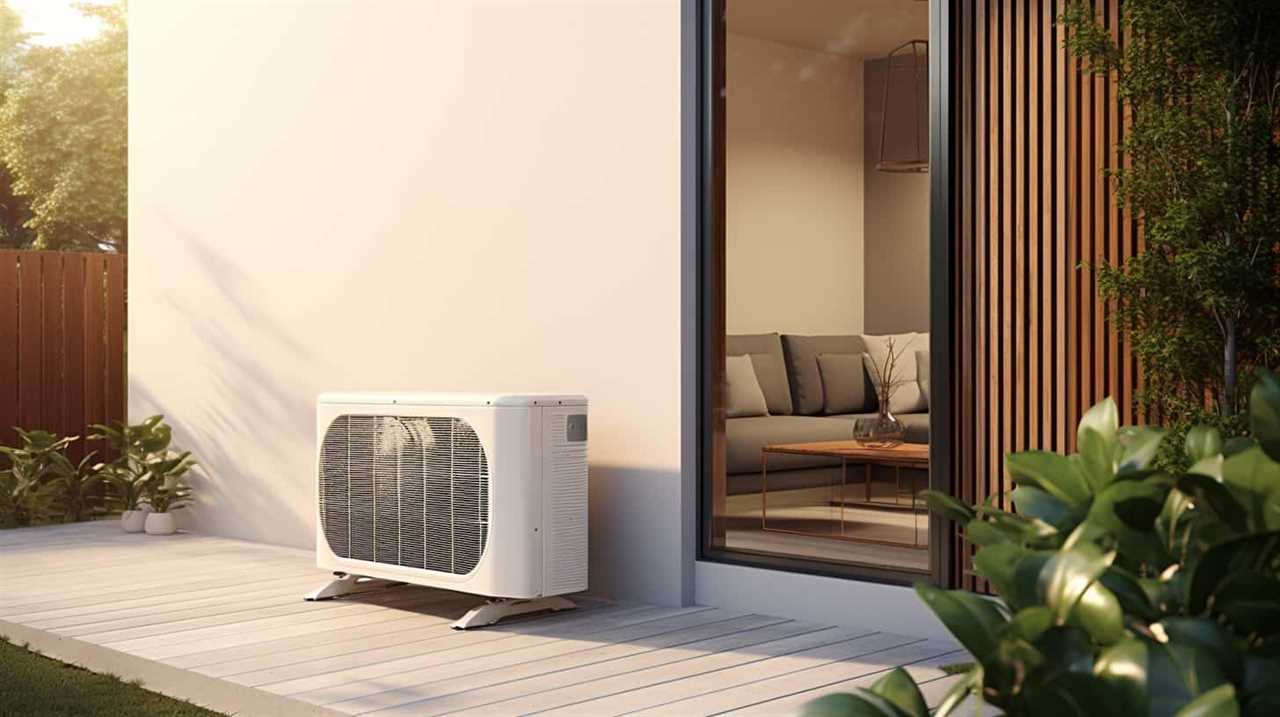
Key Takeaways
- Heat pumps consist of an evaporator, a compressor, and a condenser.
- Factors to consider when evaluating cooling and heating needs include room size, insulation, and desired temperature range.
- Determining the right size for a heat pump involves assessing specific cooling and heating needs, such as space size, insulation levels, and climate conditions.
- Energy efficiency ratings like SEER and HSPF, as well as features like variable-speed technology and Energy Star certification, should be considered for selecting a cost-effective heat pump.
Understanding the Basics of Air Conditioning Heat Pumps
We will start by discussing the three main components of air conditioning heat pumps.
Understanding heat transfer and evaluating efficiency options are crucial aspects when it comes to air conditioning heat pumps.
Heat pumps consist of an evaporator, a compressor, and a condenser. The evaporator absorbs heat from the indoor air, transferring it to the refrigerant. The compressor then pressurizes the refrigerant, raising its temperature. Finally, the condenser releases the heat absorbed from the indoor air to the outdoor environment.
Evaluating efficiency options is essential to ensure optimal performance and energy savings. Efficiency can be measured using the Seasonal Energy Efficiency Ratio (SEER) and the Heating Seasonal Performance Factor (HSPF).
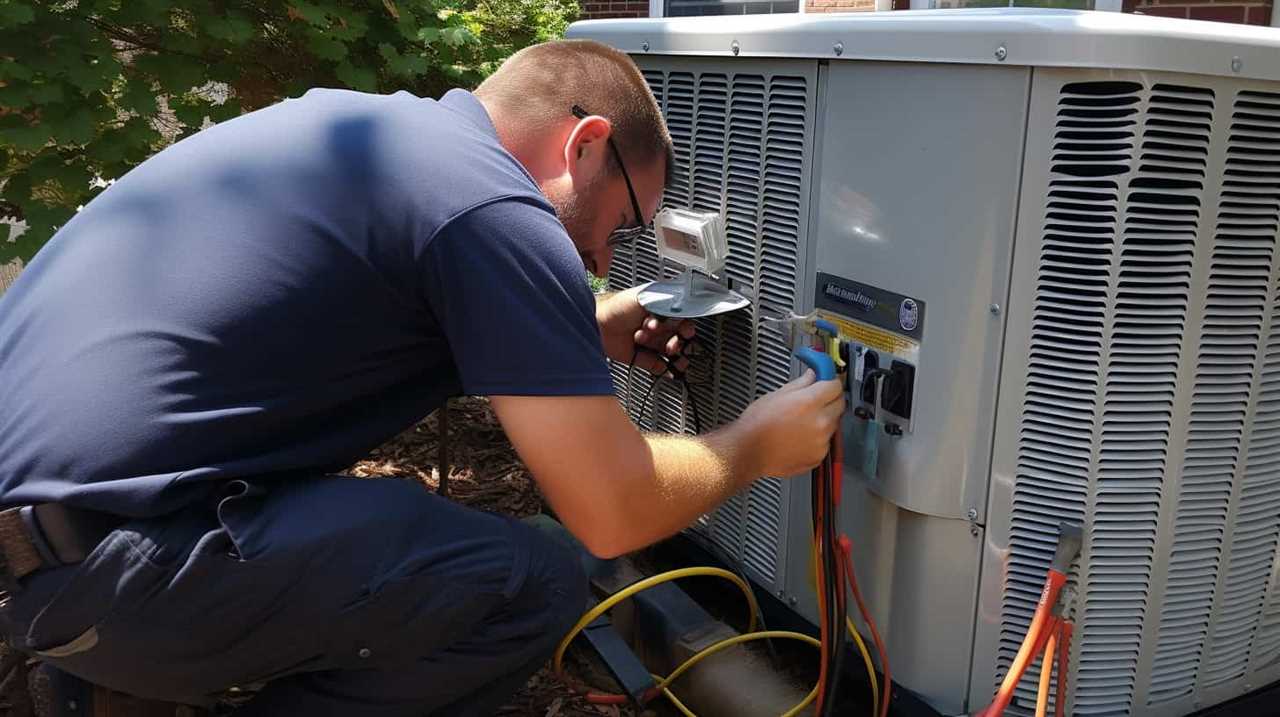
Evaluating Your Cooling and Heating Needs
To accurately evaluate our cooling and heating needs, it is important to consider factors such as room size, insulation, and desired temperature range. By understanding these factors, we can determine the appropriate cooling requirements and heating efficiency necessary for our space. Room size plays a significant role in determining the cooling and heating needs, as larger rooms require more powerful units to maintain a comfortable temperature. Insulation also affects the efficiency of the heat pump, as poor insulation can result in energy loss. Lastly, the desired temperature range influences the capacity and performance of the heat pump. To help visualize these factors, the following table provides an overview of the key considerations when evaluating cooling and heating needs:
| Factors | Considerations |
|---|---|
| Room Size | Square footage |
| Insulation | Type, quality, and condition |
| Temperature | Desired range and fluctuations |
Determining the Right Size for Your Heat Pump
When determining the right size for your heat pump, there are three key points to consider.
First, calculating the heat pump size involves assessing your specific cooling and heating needs.
Second, various factors such as the size of your space, insulation levels, and climate conditions can influence the size requirement.
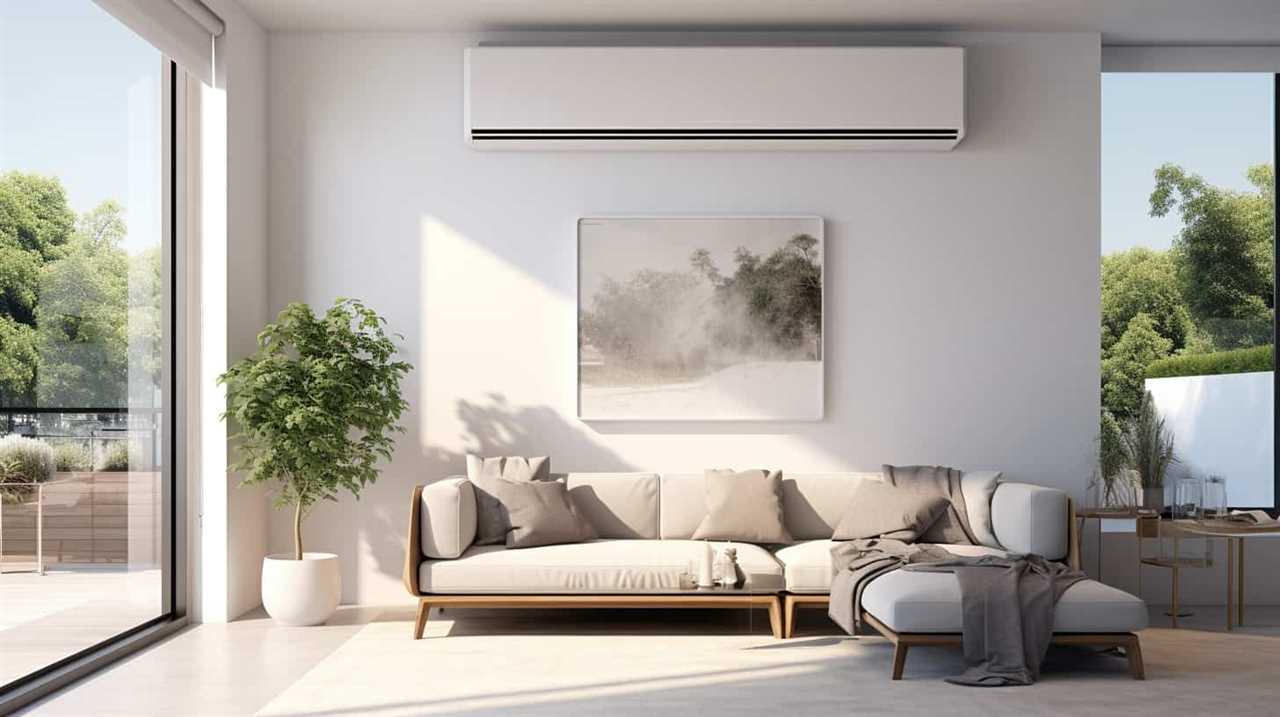
Calculating Heat Pump Size
Before purchasing a heat pump, it’s important to accurately calculate the size needed for optimal performance.
Calculating the heat pump size involves considering the heat pump efficiency and heat pump capacity.
Heat pump efficiency refers to the ratio of heat output to the electrical power input. It’s crucial to choose a heat pump with high efficiency to ensure energy savings and lower operating costs.
On the other hand, heat pump capacity refers to the amount of heat that the heat pump can produce or remove in a given time. It’s essential to accurately determine the heat pump capacity based on factors such as the size of the space to be heated or cooled, insulation levels, and the climate conditions in the area.
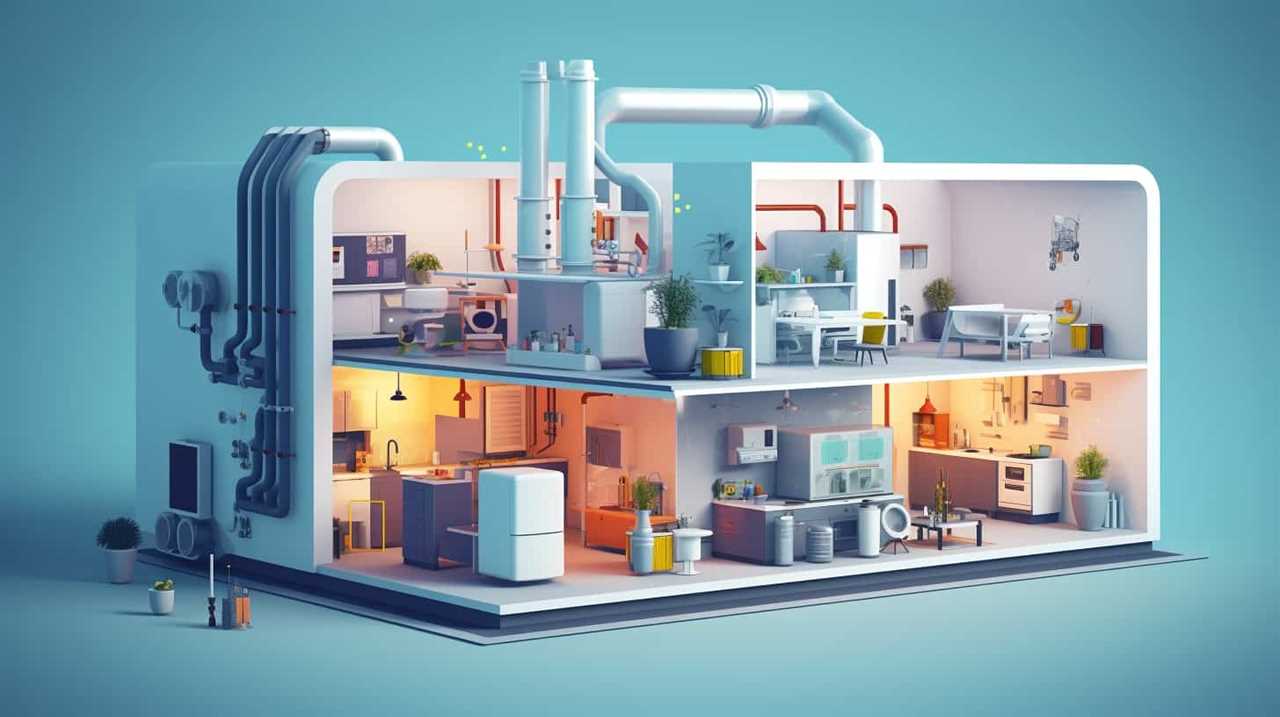
Factors Affecting Size
One important factor that affects the size of our heat pump is the square footage of the space we want to heat or cool.
Several factors should be considered when determining the right size for our heat pump, as they can have a significant impact on energy consumption:
-
Insulation: The level of insulation in our space affects how well heat is retained or blocked. Poor insulation may require a larger heat pump to compensate for heat loss.
-
Climate: The climate in our area plays a role in determining the size of the heat pump needed. Colder climates may require a larger heat pump to effectively heat the space.

-
Windows and doors: The number, size, and quality of windows and doors can impact the heat gain or loss in our space. More windows or poorly insulated doors may require a larger heat pump.
-
Occupancy and usage: The number of people occupying the space and the intended usage also affect the heat pump size. Spaces with higher occupancy or higher heat-producing activities may require a larger heat pump.
Considering these factors can help us select the right size of heat pump for our needs while minimizing energy consumption.
In the next section, we’ll discuss professional sizing recommendations to ensure accurate sizing.
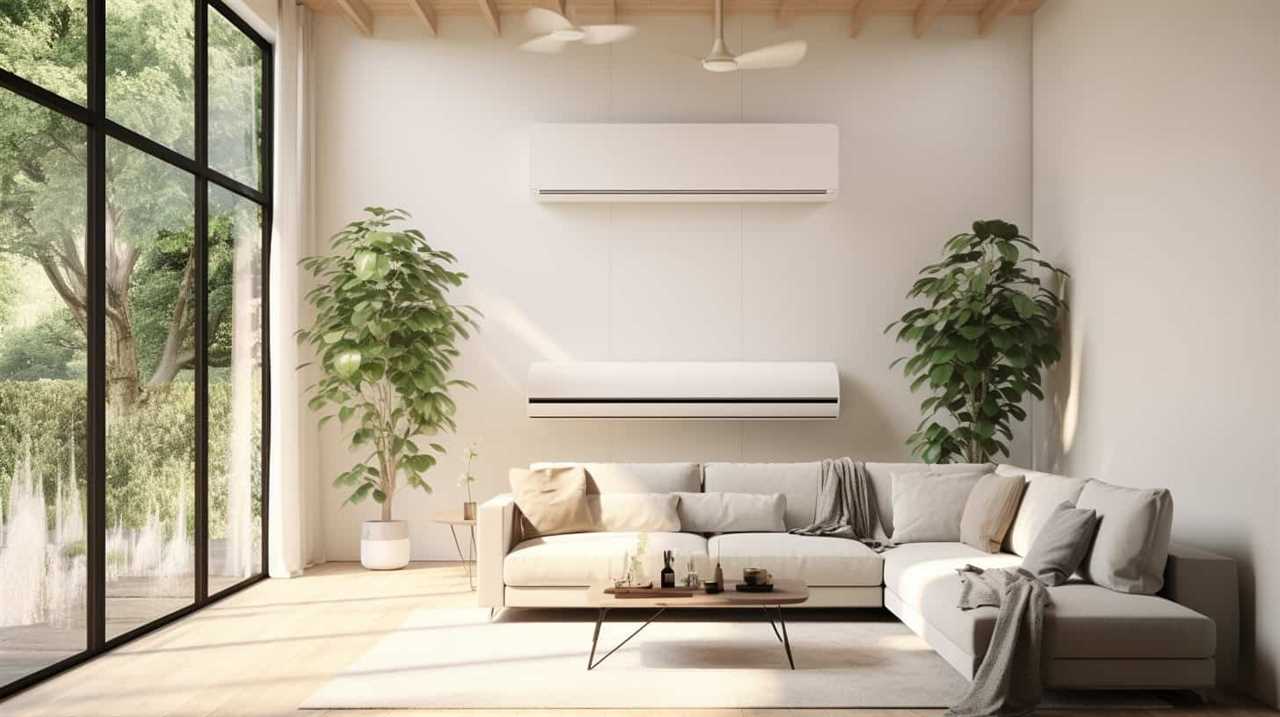
Professional Sizing Recommendations
To ensure accurate sizing, we recommend consulting with a professional for their expert recommendations on determining the right size for your heat pump. Professional sizing techniques are essential in ensuring that your heat pump is neither too small nor too large for your space.
A professional will consider various factors such as the size and layout of your home, insulation levels, and climate conditions. By conducting a thorough assessment, they can recommend the appropriate capacity and specifications for your heat pump.
Expert recommendations are vital because an oversized or undersized heat pump can lead to inefficient operation, reduced comfort, and increased energy consumption. Trusting in the expertise of a professional will ensure that you select the ideal heat pump size for your specific needs, providing optimal performance and energy efficiency.
Energy Efficiency: Finding the Most Cost-Effective Option
When evaluating air conditioning heat pumps, we prioritize finding the most cost-effective option by considering their energy efficiency. Investing in energy efficient technology not only helps reduce our carbon footprint but also leads to significant cost savings in the long run.

Here are four key factors to consider when looking for a cost-effective heat pump:
-
SEER Rating: The Seasonal Energy Efficiency Ratio (SEER) measures the cooling efficiency of the heat pump. A higher SEER rating indicates better energy efficiency and potential cost savings.
-
HSPF Rating: The Heating Seasonal Performance Factor (HSPF) measures the heating efficiency of the heat pump. Look for a high HSPF rating to ensure optimal energy efficiency and lower heating costs.
-
Variable-Speed Technology: Heat pumps with variable-speed compressors can adjust their speed based on the heating or cooling needs, resulting in reduced energy consumption and enhanced cost savings.
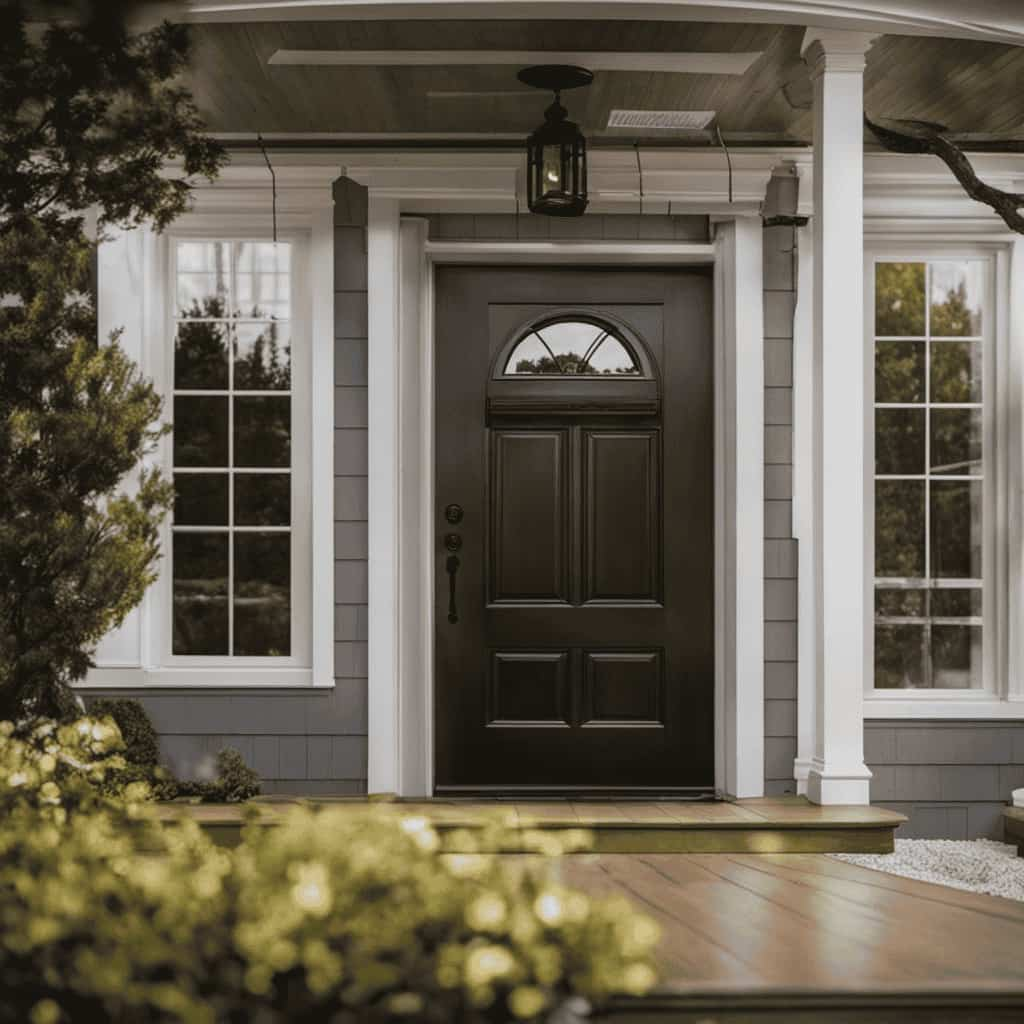
-
Energy Star Certification: Choosing an energy-efficient heat pump with the Energy Star label ensures that it meets strict energy efficiency standards, providing assurance of long-term cost savings.
Exploring Different Heat Pump Types and Features
As we explore different heat pump types and features, we can evaluate their suitability for our specific heating and cooling needs.
Heat pump technology has advanced significantly in recent years, offering various options to improve energy efficiency and reduce operating costs.
One important feature to consider is the Seasonal Energy Efficiency Ratio (SEER), which measures the cooling efficiency of the heat pump. Higher SEER ratings indicate better energy savings.
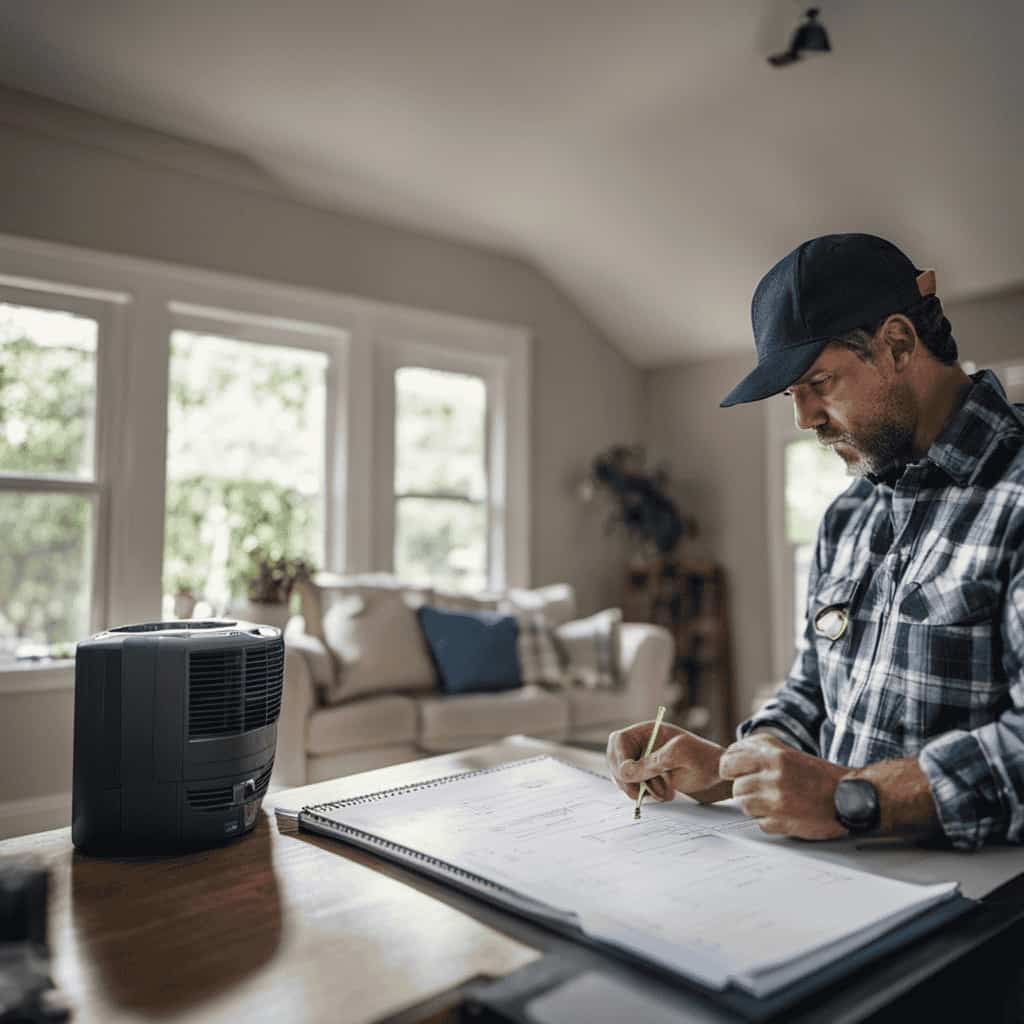
Another key feature is the Heating Seasonal Performance Factor (HSPF), which measures the heating efficiency of the heat pump. Look for a high HSPF rating to ensure efficient heating during colder months.
Additionally, some heat pumps come with energy-saving features such as variable-speed compressors and smart thermostats, which further optimize energy consumption.
Comparing Performance and SEER Ratings
As we compare performance and SEER ratings, it’s important to consider the energy efficiency and cooling capabilities of different air conditioning heat pump models. The SEER (Seasonal Energy Efficiency Ratio) rating measures the cooling efficiency of an air conditioner or heat pump. Higher SEER ratings indicate greater energy efficiency and lower operating costs.
When comparing performance and SEER ratings, there are several techniques to consider:

-
Review SEER rating benefits: A higher SEER rating can lead to lower energy bills and reduced environmental impact. It also indicates better performance and improved comfort.
-
Evaluate cooling capabilities: Look for models with higher BTU (British Thermal Unit) ratings, as they can provide more efficient and effective cooling.
-
Consider noise levels: Look for models with lower decibel (dB) ratings to ensure quieter operation.
-
Compare additional features: Consider features such as programmable thermostats, variable speed motors, and advanced filtration systems, which can enhance overall performance and energy efficiency.

Assessing Noise Levels and Indoor Air Quality
To properly assess noise levels and indoor air quality, we should consider the decibel ratings and filtration systems of different air conditioning heat pump models. When assessing noise levels, it’s important to choose a heat pump that operates quietly, especially if it will be installed in a bedroom or living area. Look for heat pumps with low decibel ratings, typically below 60 decibels, to ensure minimal disruption to your daily activities and sleep.
Additionally, evaluating the indoor air quality is crucial for maintaining a healthy and comfortable environment. Consider heat pumps with advanced filtration systems that can effectively remove dust, pollen, and other allergens from the air. By assessing noise levels and indoor air quality, you can select a heat pump that not only provides optimal temperature control but also promotes a clean and quiet living space.
Moving on to the next section, let’s explore the importance of considering installation and maintenance requirements.
Considering Installation and Maintenance Requirements
For our installation and maintenance requirements, we need to carefully consider the location and accessibility of the heat pump, as well as the regular cleaning and servicing that will be necessary to ensure its optimal performance. Here are a few important factors to keep in mind:

-
Placement: Choose a location that allows for proper airflow and easy access for maintenance. Avoid areas with obstructions or limited space, as this can hinder the heat pump’s efficiency and increase installation costs.
-
Regular Cleaning: Dust and debris can accumulate on the heat pump’s outdoor unit, affecting its performance. Regularly clean the unit using a soft brush or hose to remove any dirt or debris.
-
Scheduled Servicing: To maintain optimal performance, schedule regular servicing by a qualified professional. They can inspect and clean the internal components, check refrigerant levels, and ensure all parts are functioning correctly.
-
Maintenance Tips: In addition to professional servicing, there are some maintenance tips you can follow. These include regularly checking and replacing air filters, keeping the surrounding area clean and free from obstructions, and ensuring proper insulation in ductwork.

Budgeting for Your Air Conditioning Heat Pump Investment
When budgeting for your air conditioning heat pump investment, there are several cost considerations and options to keep in mind.
It’s important to assess the initial purchase price, installation costs, and any additional expenses such as ductwork modifications or electrical upgrades.
However, it’s also crucial to consider the long-term savings potential of an energy-efficient heat pump and the return on investment it can provide over time.
Cost Considerations and Options
As homeowners, we need to carefully consider the cost and options associated with our air conditioning heat pump investment.

When it comes to cost considerations, there are a few key factors to keep in mind:
-
Installation Costs: The cost of installing an air conditioning heat pump can vary depending on factors such as the size of your home and the complexity of the installation. It’s important to budget for these upfront costs to ensure a smooth installation process.
-
Energy Efficiency: It’s worth investing in an air conditioning heat pump that’s energy efficient. This won’t only help you save on your monthly energy bills, but it will also have a positive impact on the environment. Look for models with high SEER (Seasonal Energy Efficiency Ratio) ratings to ensure optimal efficiency.
-
Maintenance and Repair Costs: It’s important to factor in ongoing maintenance and repair costs when budgeting for your air conditioning heat pump investment. Regular maintenance will help prolong the lifespan of your system and prevent costly repairs down the line.

-
Financing Options: Consider the various financing options available to you. Some manufacturers or HVAC companies offer financing plans that can help make your investment more affordable. Explore these options and choose one that aligns with your budget and financial goals.
Long-Term Savings Potential
Let’s consider the long-term savings potential of our air conditioning heat pump investment and budget accordingly. When it comes to choosing the ideal air conditioning heat pump, it’s important to evaluate the energy saving benefits it offers. By selecting a model with high energy efficiency, we can significantly reduce our energy consumption and costs over time. This won’t only benefit our budget but also contribute to a more sustainable environment.
To determine the long-term savings potential, we should also consider the payback period of the heat pump. The payback period refers to the time it takes for the energy savings to offset the initial investment cost. Typically, the shorter the payback period, the better the investment. By calculating the payback period, we can make an informed decision about which air conditioning heat pump offers the most cost-effective solution in the long run.
Return on Investment
To ensure a successful budget for our air conditioning heat pump investment, we need to carefully consider the return on investment (ROI). Conducting an ROI analysis allows us to determine the financial benefits and payback period of our investment. Here are four important factors to consider:
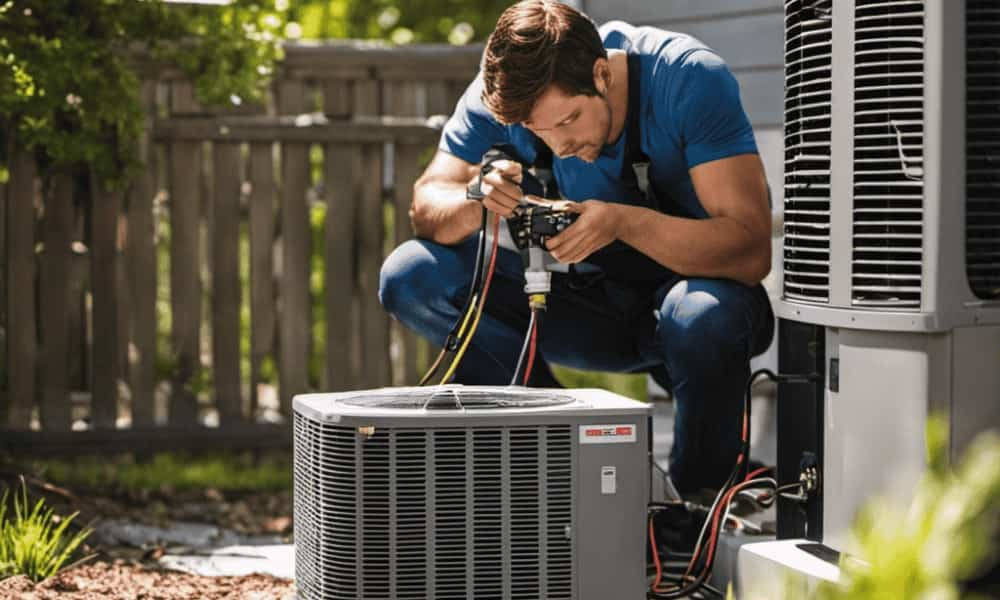
-
Energy Savings: An energy-efficient heat pump can significantly reduce monthly utility bills, resulting in long-term savings.
-
Maintenance Costs: Consider the cost of regular maintenance and repairs. Opting for a high-quality heat pump may result in lower maintenance expenses over time.
-
Lifespan of the Heat Pump: A longer lifespan means a higher ROI. Investing in a durable and reliable heat pump can save money in the long run.
-
Potential Incentives: Research potential rebates or tax credits available for energy-efficient equipment. These incentives can further improve the ROI of our investment.

Frequently Asked Questions
How Much Does an Air Conditioning Heat Pump Cost to Install?
Installation costs for an air conditioning heat pump depend on various factors, such as the size of the unit, complexity of the installation, and any necessary modifications. Prices can range from a few thousand dollars to upwards of $10,000.
Can an Air Conditioning Heat Pump Be Used in Extremely Cold Climates?
In extremely cold climates, air conditioning heat pumps can still be used effectively. However, it’s important to consider the impact of climate change on their usage. We must adapt to the changing conditions to ensure optimal performance.
Are There Any Tax Incentives or Rebates Available for Purchasing an Air Conditioning Heat Pump?
Yes, there are tax incentives and rebates available for purchasing an air conditioning heat pump. These incentives are often based on the energy efficiency of the unit and can help offset the initial cost of installation.
How Long Does an Air Conditioning Heat Pump Typically Last?
Air conditioning heat pumps typically last between 10-15 years with proper maintenance. However, if not maintained, they can fail sooner. Signs of a failing heat pump include reduced cooling/heating capacity, strange noises, and increased energy consumption.
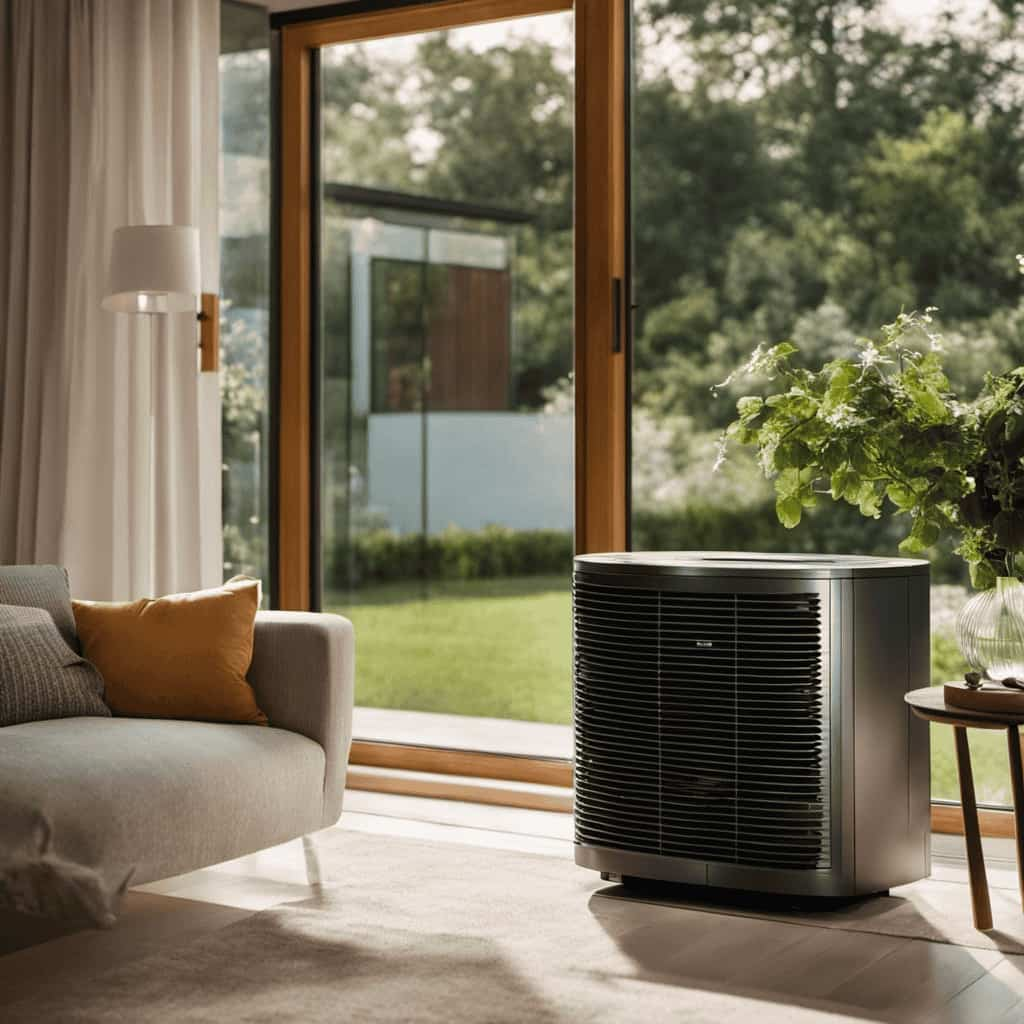
Is It Possible to Retrofit an Existing HVAC System With an Air Conditioning Heat Pump?
Yes, it is possible to retrofit an existing HVAC system with an air conditioning heat pump. When considering retrofitting, there are important considerations such as compatibility, sizing, and cost. The benefits of air conditioning heat pumps include energy efficiency and year-round comfort.
Conclusion
In conclusion, selecting the ideal air conditioning heat pump requires careful evaluation of your cooling and heating needs. This involves determining the right size for your space, considering energy efficiency, exploring different types and features, and comparing performance and SEER ratings.
Additionally, it is important to assess noise levels and indoor air quality. This will help ensure that the air conditioning heat pump you choose will not only effectively cool and heat your space but also provide a comfortable and healthy environment.
Finally, budgeting for installation and maintenance is crucial. It is important to consider the upfront costs of purchasing and installing the heat pump, as well as the ongoing costs of maintenance and repairs. By taking all these factors into account, you can make an informed decision and invest in a cost-effective and efficient air conditioning heat pump for your home or business.
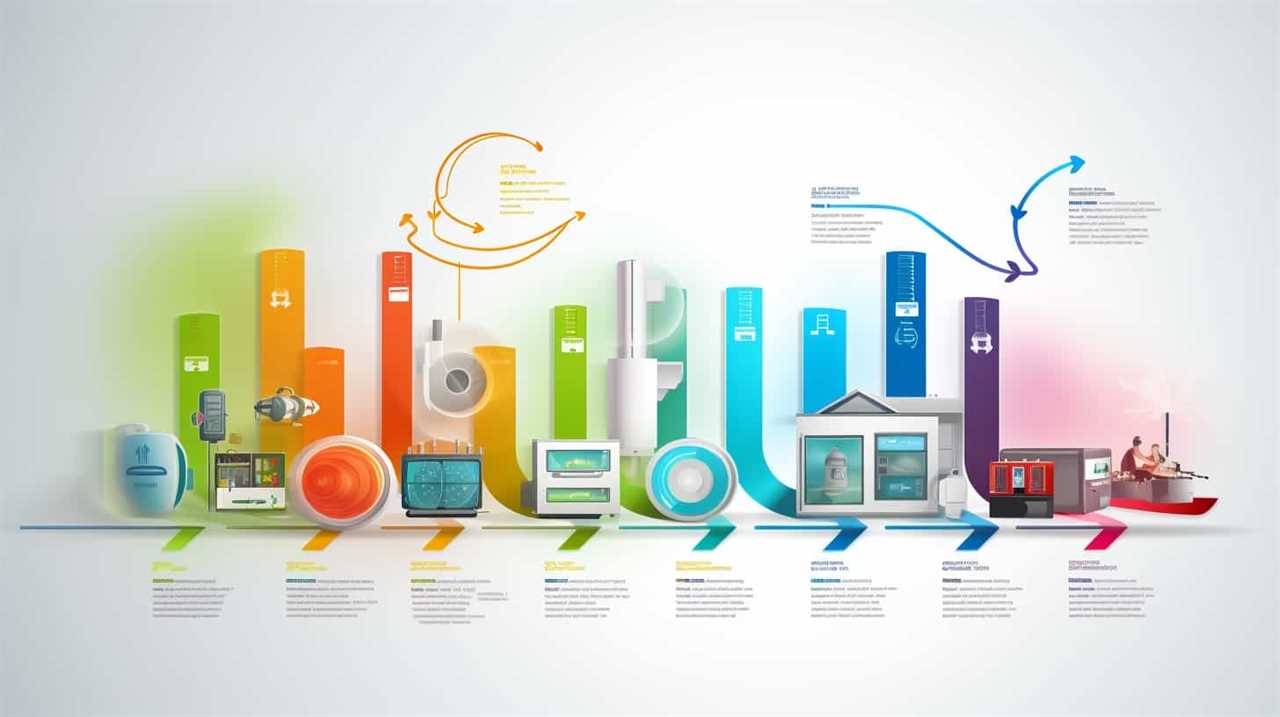
Air Conditioning
Renewable Energy: Revolutionizing Heat Pump Performance

We have seen an incredible change in heat pump performance worldwide. The incorporation of renewable energy sources has transformed the efficiency and effectiveness of these systems.
In fact, studies have shown that by incorporating renewable energy, heat pump performance can be enhanced by up to 40%. This statistic alone highlights the immense potential and impact of renewable energy in the realm of heat pumps.
In this article, we will explore the advantages, technologies, and successful applications of this groundbreaking innovation. Get ready to master the future of renewable energy and heat pump performance.
Key Takeaways
- Incorporating renewable energy can enhance heat pump performance by up to 40%.
- Tapping into geothermal energy allows heat pumps to achieve higher efficiencies and reduce reliance on traditional energy sources.
- Integrating renewable energy reduces reliance on fossil fuels and decreases greenhouse gas emissions.
- Variable speed compressors and thermal storage systems are key technologies for enhancing heat pump efficiency with renewable energy.
The Role of Renewable Energy in Heat Pump Performance
In our article, we’ll explore the role of renewable energy in revolutionizing heat pump performance.
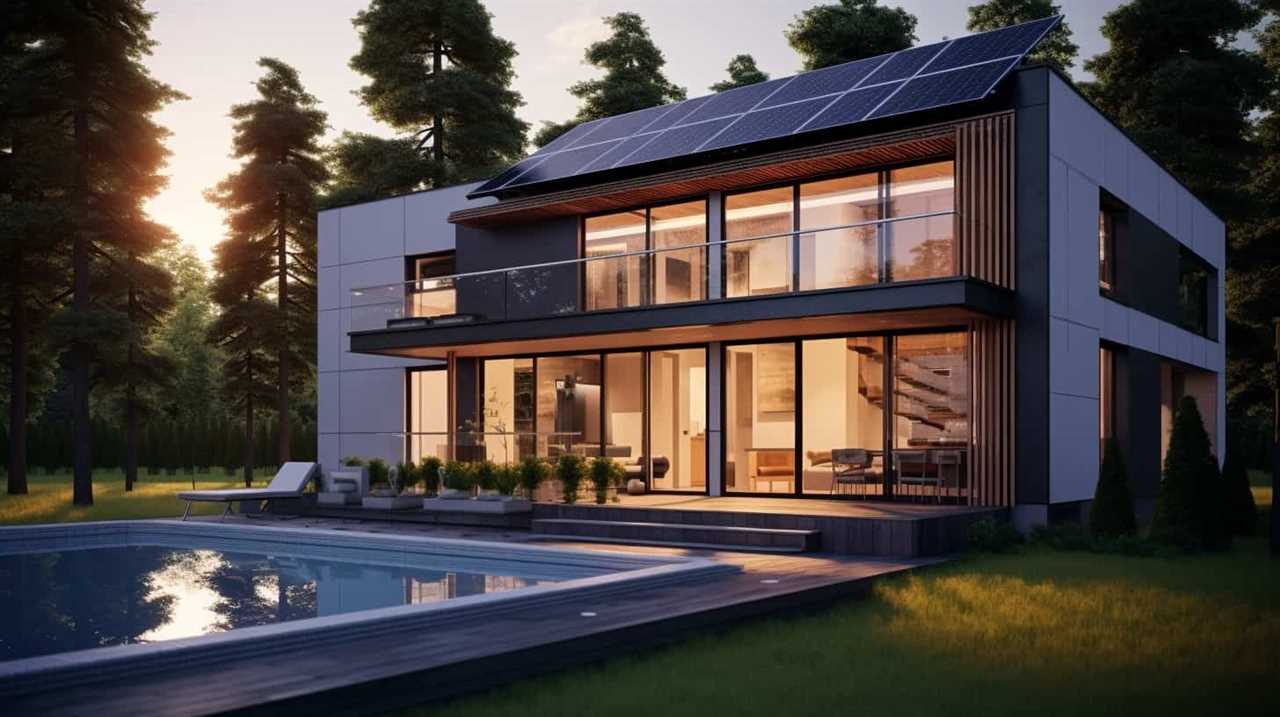
One key aspect is the utilization of geothermal energy, which plays a crucial role in enhancing heat pump performance. Geothermal energy harnesses the heat stored within the Earth, providing a consistent and renewable source of power for heat pumps. By tapping into this energy, heat pumps can achieve higher efficiencies and reduce their reliance on traditional energy sources.
Another significant factor is the impact of solar energy on heat pump efficiency. Solar energy, through the use of photovoltaic panels, can power heat pumps directly, enabling them to operate without drawing electricity from the grid. This integration of solar energy further enhances the overall performance and sustainability of heat pumps.
As we delve into the advantages of integrating renewable energy with heat pumps, these aspects will become even more apparent.
Advantages of Integrating Renewable Energy With Heat Pumps
How can integrating renewable energy with heat pumps benefit us?

The integration of renewable energy with heat pumps offers several advantages, making it a compelling option for optimizing heat pump performance. By harnessing renewable energy sources such as solar or wind power, we can significantly reduce our reliance on fossil fuels and decrease greenhouse gas emissions. This not only contributes to a more sustainable and environmentally friendly energy system but also helps to combat climate change.
Additionally, integrating renewable energy with heat pumps can lead to cost savings by reducing energy consumption and lowering utility bills. Moreover, renewable energy integration allows for better control and flexibility in managing energy supply and demand, leading to improved overall system efficiency.
These benefits highlight the potential of combining renewable energy and heat pumps to create a more efficient and sustainable heating and cooling solution.
In the next section, we’ll explore key technologies for enhancing heat pump efficiency with renewable energy.

Key Technologies for Enhancing Heat Pump Efficiency With Renewable Energy
By utilizing advanced technologies and incorporating renewable energy sources, we can significantly enhance the efficiency of heat pumps. In renewable energy applications, heat pump optimization plays a crucial role in achieving higher performance levels.
One key technology for enhancing heat pump efficiency is the use of variable speed compressors. These compressors allow for precise control of the heat pump’s operation, adjusting the speed and capacity according to the heating or cooling demand. By matching the output to the required load, energy wastage is minimized, resulting in improved efficiency.
Another technology is the integration of thermal storage systems. These systems store excess thermal energy generated by the heat pump during periods of low demand and release it during peak demand, reducing the need for the heat pump to operate at full capacity.
Furthermore, advanced control algorithms and sensors can optimize the heat pump’s operation by continuously monitoring and adjusting parameters such as temperature, pressure, and airflow.

These technologies, when combined with renewable energy sources, can revolutionize heat pump performance, making them a key component in achieving sustainable and efficient heating and cooling systems.
Case Studies: Successful Applications of Renewable Energy in Heat Pump Systems
We frequently encounter successful applications of renewable energy in heat pump systems, showcasing their effectiveness and potential for widespread adoption. These case studies provide real-world examples of how renewable energy can be integrated into heat pump systems to achieve significant energy savings and reduce carbon emissions.
| Case Study | Description |
|---|---|
| Residential Building | A residential building in a cold climate utilized a ground source heat pump system with geothermal energy. This system was able to provide heating and cooling for the entire building while reducing energy consumption by 50%. |
| Industrial Facility | An industrial facility implemented an air-to-water heat pump system with solar thermal panels. This system was able to meet the facility’s heating and hot water demands while reducing energy costs by 40%. |
| Commercial Complex | A commercial complex installed an air-source heat pump system with rooftop solar panels. This system provided heating and cooling for the complex, resulting in a 30% reduction in energy consumption and significant cost savings. |
These successful case studies demonstrate the feasibility and benefits of incorporating renewable energy into heat pump systems, making them a viable solution for achieving sustainable and efficient heating and cooling in various applications.
Future Prospects: Innovations and Trends in Renewable Energy for Heat Pumps
As we look ahead, the future prospects for renewable energy in heat pumps show promising innovations and emerging trends. The advancements in renewable energy for heat pumps are driving the industry towards a more sustainable and efficient future.

Here are four key areas where we see significant developments:
-
Integration of Energy Storage:
With the increasing availability and declining costs of batteries, integrating energy storage systems with heat pumps is becoming more feasible. This allows for better utilization of renewable energy sources and increased flexibility in managing energy demand. -
Smart Grid Integration:
The integration of heat pumps with smart grid technologies enables demand response and grid optimization. By leveraging real-time data and advanced control algorithms, heat pumps can be operated more efficiently and contribute to a more resilient and reliable grid. -
Hybrid Systems:
Combining heat pumps with other renewable energy technologies, such as solar thermal or geothermal, can enhance their performance and overall energy efficiency. These hybrid systems offer the potential for higher energy savings and reduced carbon emissions.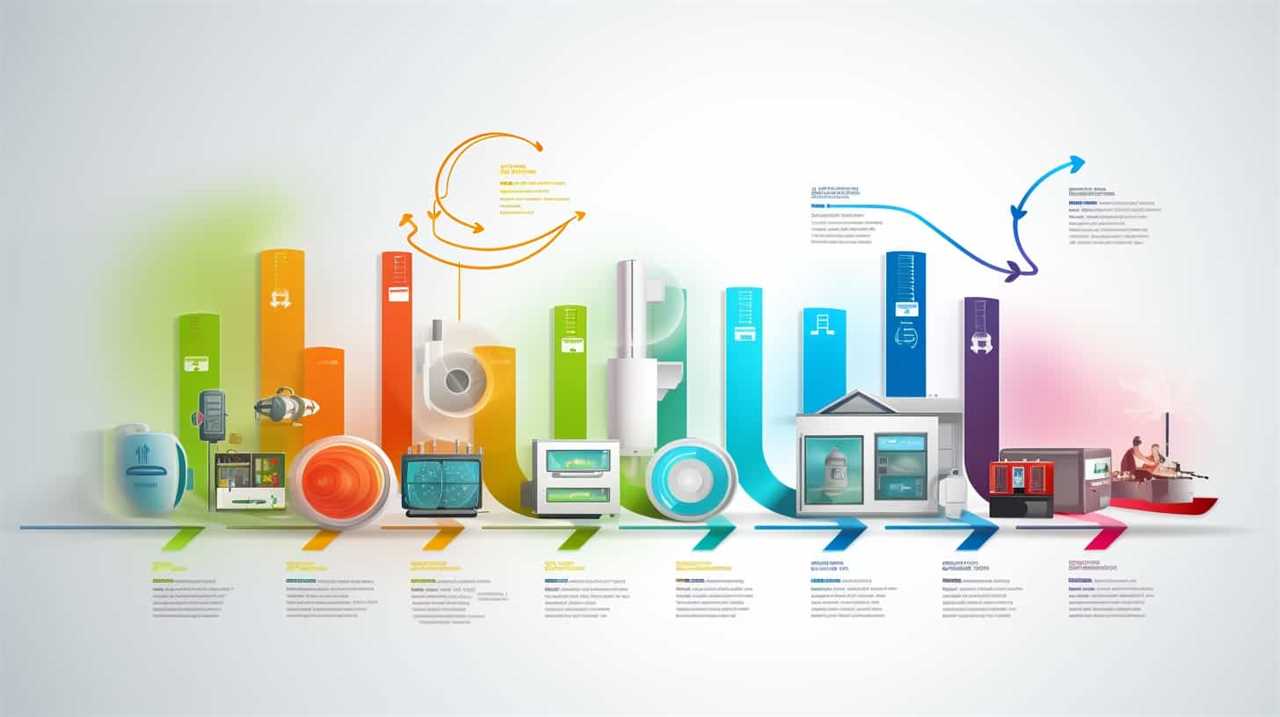
-
Heat Pump Electrification:
As the electricity sector transitions to renewable sources, electrifying heat pumps becomes an attractive option. This trend opens up new market opportunities for renewable energy in the heat pump industry, with the potential to significantly reduce greenhouse gas emissions.
These emerging technologies and market opportunities are paving the way for a greener and more sustainable future for heat pumps. By embracing these innovations and trends, we can revolutionize the performance and impact of renewable energy in the heat pump sector.
Frequently Asked Questions
How Do Heat Pumps Work and What Is Their Role in Renewable Energy Systems?
Heat pump technology utilizes the transfer of heat from one place to another, providing efficient heating and cooling. Its role in renewable energy systems lies in its ability to extract heat from renewable sources, reducing reliance on fossil fuels and lowering carbon emissions.
What Are the Main Advantages of Integrating Renewable Energy Sources With Heat Pumps?
What are the main advantages of integrating renewable energy sources with heat pumps? By combining renewable energy with heat pumps, we maximize energy efficiency, reduce carbon emissions, and contribute to a sustainable future.

What Are Some Key Technologies That Can Enhance the Efficiency of Heat Pumps When Combined With Renewable Energy?
Energy efficient technologies, such as advanced compressors and smart controls, can significantly enhance the efficiency of heat pumps when combined with renewable energy sources. These innovations optimize performance and maximize the utilization of clean, sustainable energy.
Can You Provide Any Real-Life Examples of Successful Applications of Renewable Energy in Heat Pump Systems?
Real-life case studies showcase the benefits and challenges of incorporating renewable energy into heat pump systems. One example is the successful application of geothermal heat pumps in residential buildings, reducing energy consumption and carbon emissions.
What Are the Current and Future Innovations and Trends in Renewable Energy for Heat Pumps?
Innovations in heat pump technology and future trends in renewable energy for heat pumps are shaping the way we maximize efficiency and reduce emissions. We explore the latest advancements and upcoming developments in this field.
Conclusion
In conclusion, the integration of renewable energy with heat pump systems has revolutionized their performance, offering numerous advantages and enhancing efficiency. This combination of technologies has proven successful in various case studies, showcasing its potential for widespread implementation.
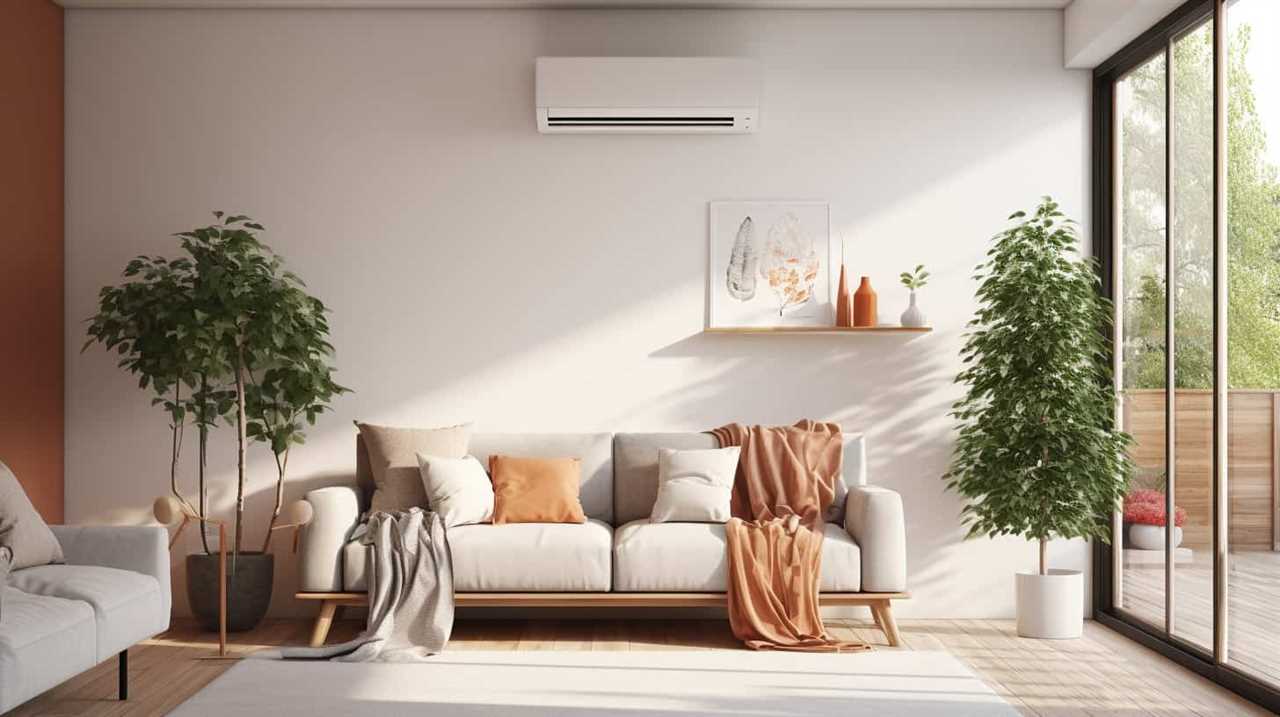
As innovations continue to emerge, the future prospects for renewable energy in heat pumps are promising. By harnessing the power of renewable sources, we can achieve sustainable and cost-effective heating solutions, paving the way for a greener and more efficient future.
Remember, ‘Innovation is the key to unlocking a sustainable future.’
Air Conditioning
Understanding Energy-Efficient Heat Pumps for Green Homes

We have all the information on energy-efficient heat pumps for environmentally friendly homes. These sustainable systems are top-notch when it comes to heating and cooling while also benefiting the planet.
In this article, we’ll break down how these pumps work, what to consider when choosing one, and the different types available. Plus, we’ll share tips on maximizing energy savings through proper maintenance.
Get ready to dive into the world of eco-friendly heating and cooling!
Key Takeaways
- Energy-efficient insulation materials and renewable energy sources are important for creating eco-friendly and cost-effective green homes.
- Heat pumps utilize heat transfer to provide sustainable heating and cooling while minimizing environmental impact.
- When choosing an energy-efficient heat pump, consider factors such as SEER and HSPF ratings, variable speed compressors, dual fuel capability, and environmentally friendly refrigerants.
- Different types of heat pumps, such as air source, ground source, and water source, have different applications based on climate, available space, and budget.
The Importance of Energy Efficiency in Green Homes
We believe that maximizing energy efficiency should be a top priority in our green homes. One way to achieve this is through energy-efficient insulation. By using insulation materials that have a high R-value, such as cellulose or spray foam, we can reduce heat loss and minimize the need for heating or cooling. This not only helps to lower energy consumption but also creates a comfortable living environment.

Additionally, incorporating renewable energy sources in energy-efficient homes can further enhance their sustainability. Solar panels, for example, can harness the power of the sun to generate electricity, reducing our reliance on fossil fuels. By prioritizing energy efficiency and utilizing renewable energy sources, we can create homes that are both eco-friendly and cost-effective.
Transitioning to the next section, let’s now explore how heat pumps work for sustainable heating and cooling.
How Heat Pumps Work for Sustainable Heating and Cooling
To understand how heat pumps work for sustainable heating and cooling, it’s important to grasp the process of heat transfer and the role of refrigerant in this system.
Heat pump technology utilizes the principle of heat transfer to extract heat from the environment and transfer it into a building for heating or remove heat from the building for cooling. This process is achieved by circulating a refrigerant, which absorbs heat when it evaporates and releases heat when it condenses. The refrigerant acts as the medium that facilitates the transfer of heat.

By utilizing this process, heat pumps can provide efficient heating and cooling while minimizing their environmental impact.
Now that we understand the basics of how heat pumps work, let’s explore the key factors to consider when choosing an energy-efficient heat pump.
Key Factors to Consider When Choosing an Energy-Efficient Heat Pump
Considering the efficiency, cost, and environmental impact are key factors when choosing an energy-efficient heat pump. To ensure you make the right decision, here are some important criteria and energy-saving features to consider:
-
Seasonal Energy Efficiency Ratio (SEER): Look for a heat pump with a high SEER rating, as it indicates better energy efficiency.

-
Heating Seasonal Performance Factor (HSPF): Higher HSPF ratings translate to more efficient heating performance.
-
Variable Speed Compressor: This feature allows the heat pump to adjust its speed according to the heating or cooling needs, resulting in better energy savings.
-
Dual Fuel Capability: Opt for a heat pump that can switch between electric and gas heating, allowing you to choose the most cost-effective option.
-
Refrigerant Type: Consider heat pumps that use environmentally friendly refrigerants with low global warming potential.
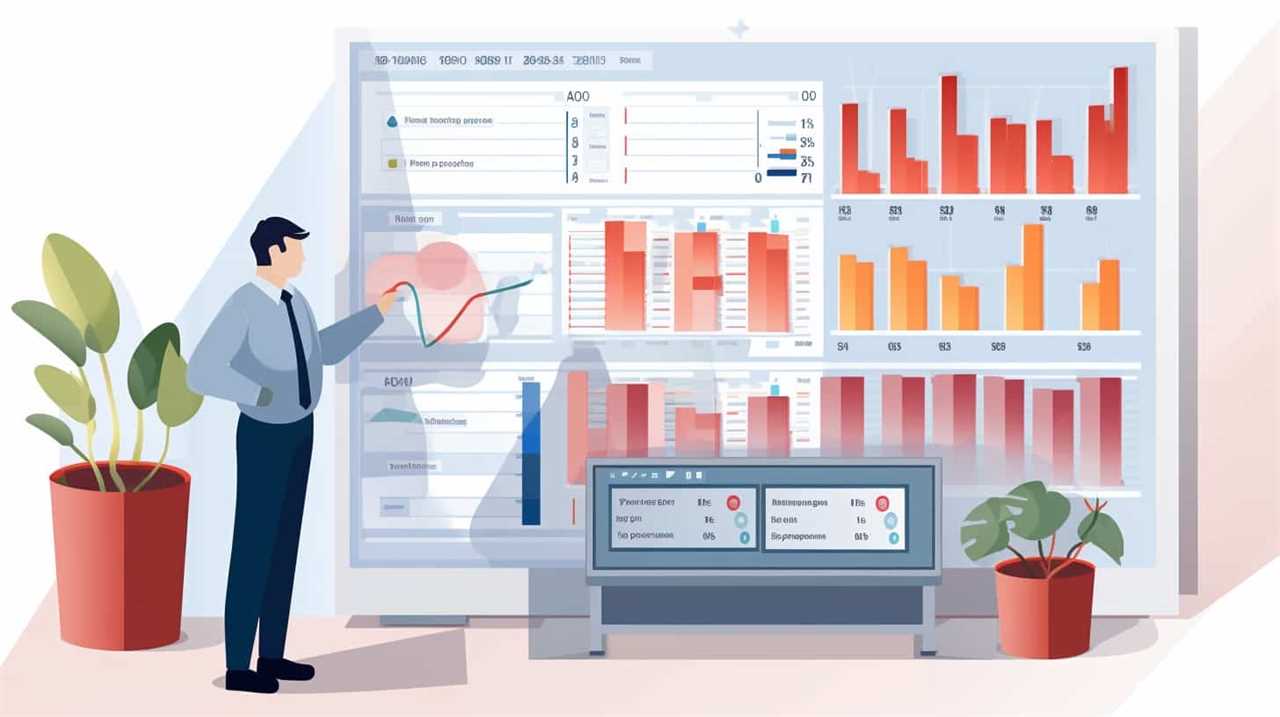
Understanding the Different Types of Heat Pumps for Green Homes
As we delve into the topic of understanding the different types of heat pumps for green homes, it is important to note that there are several options available to homeowners. Heat pumps are a popular choice for heating and cooling homes efficiently while minimizing environmental impact. Let’s take a closer look at the different types of heat pumps commonly used in green homes:
| Type | Description | Benefits |
|---|---|---|
| Air Source | Transfers heat between the indoor air and outdoor air | Cost-effective, easy installation, suitable for moderate climates |
| Ground Source | Utilizes the stable temperature of the ground to heat and cool homes | Highly efficient, long lifespan, consistent performance |
| Water Source | Extracts heat from water bodies, such as lakes or wells | High efficiency, versatile applications, reliable performance |
Choosing the right type of heat pump for your green home depends on factors such as climate, available space, and budget. Additionally, it’s worth exploring heat pump installation rebates and incentives offered by local and federal governments to make your investment more affordable.
Maximizing Energy Savings With Proper Heat Pump Maintenance
By regularly performing proper heat pump maintenance, we can maximize energy savings in our green homes. Maintaining our heat pumps not only ensures their efficiency but also reduces our carbon footprint. Here are some heat pump maintenance tips and energy-saving practices to help us achieve optimal performance and energy efficiency:
- Clean or replace air filters regularly to improve airflow and reduce energy consumption.
- Keep the outdoor unit free from debris, such as leaves and branches, to maintain proper airflow.
- Schedule professional maintenance annually to check for refrigerant leaks, clean coils, and optimize system performance.
- Insulate the air ducts to minimize heat loss during the distribution process.
- Use a programmable thermostat to set temperature schedules and avoid unnecessary energy consumption.
Frequently Asked Questions
Can Heat Pumps Be Used to Heat Water in Addition to Providing Heating and Cooling for the Home?
Yes, heat pumps can be used for heating water as well as providing heating and cooling for the home. Using heat pumps for swimming pools and water heating offers numerous benefits, such as energy efficiency and reduced greenhouse gas emissions.
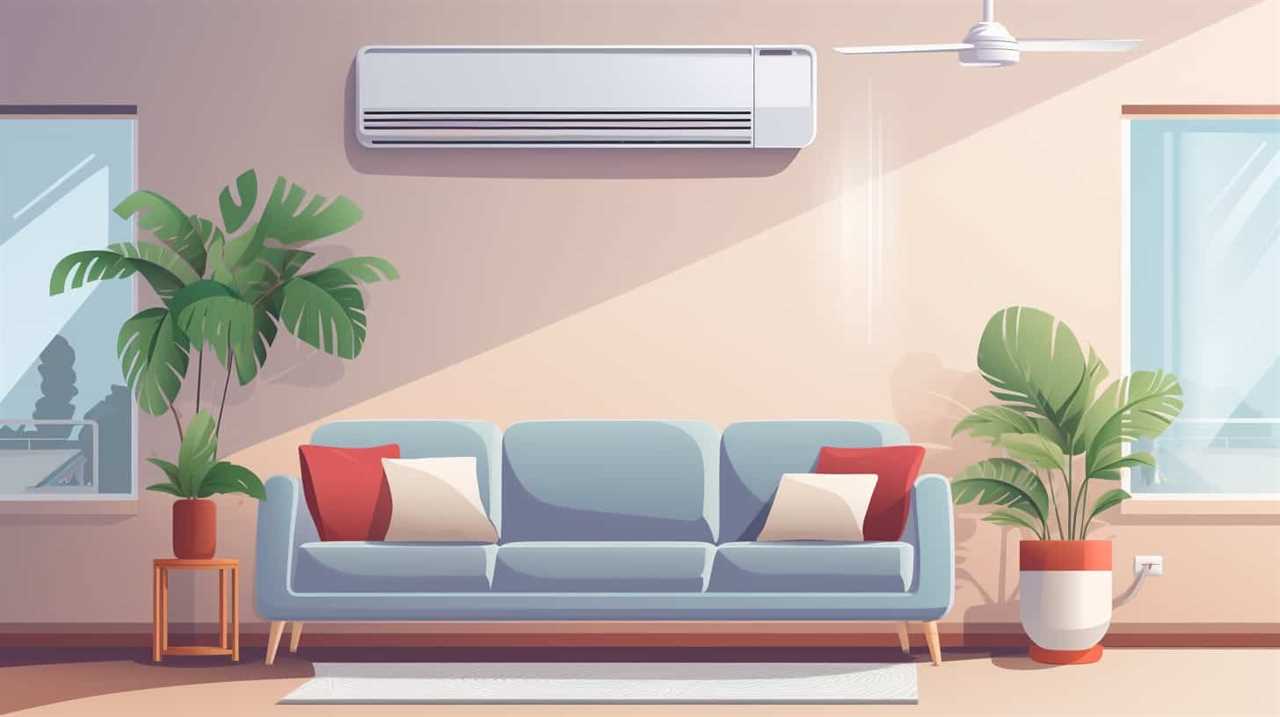
Are There Any Government Incentives or Rebates Available for Installing Energy-Efficient Heat Pumps in Green Homes?
Yes, there are government incentives, rebates, and tax credits available for installing energy-efficient heat pumps in green homes. These financial assistance programs aim to promote the use of energy-efficient technologies and reduce carbon emissions.
What Is the Average Lifespan of an Energy-Efficient Heat Pump?
The average lifespan of an energy-efficient heat pump is typically around 15 to 20 years. Regular maintenance tasks, such as cleaning and replacing filters, can help prolong its lifespan and ensure optimal performance.
Are There Any Specific Maintenance Tasks That Homeowners Can Do Themselves to Ensure the Optimal Performance of Their Heat Pump?
To ensure optimal performance of your heat pump, there are self-maintenance tips and troubleshooting techniques you can follow. Regularly cleaning or replacing air filters, checking refrigerant levels, and inspecting outdoor units are essential tasks.
How Does the Cost of Operating an Energy-Efficient Heat Pump Compare to Traditional Heating and Cooling Systems?
Operating costs comparison between energy-efficient heat pumps and traditional heating and cooling systems reveal significant energy savings. Our research shows that these green alternatives are not only eco-friendly but also cost-effective in the long run.
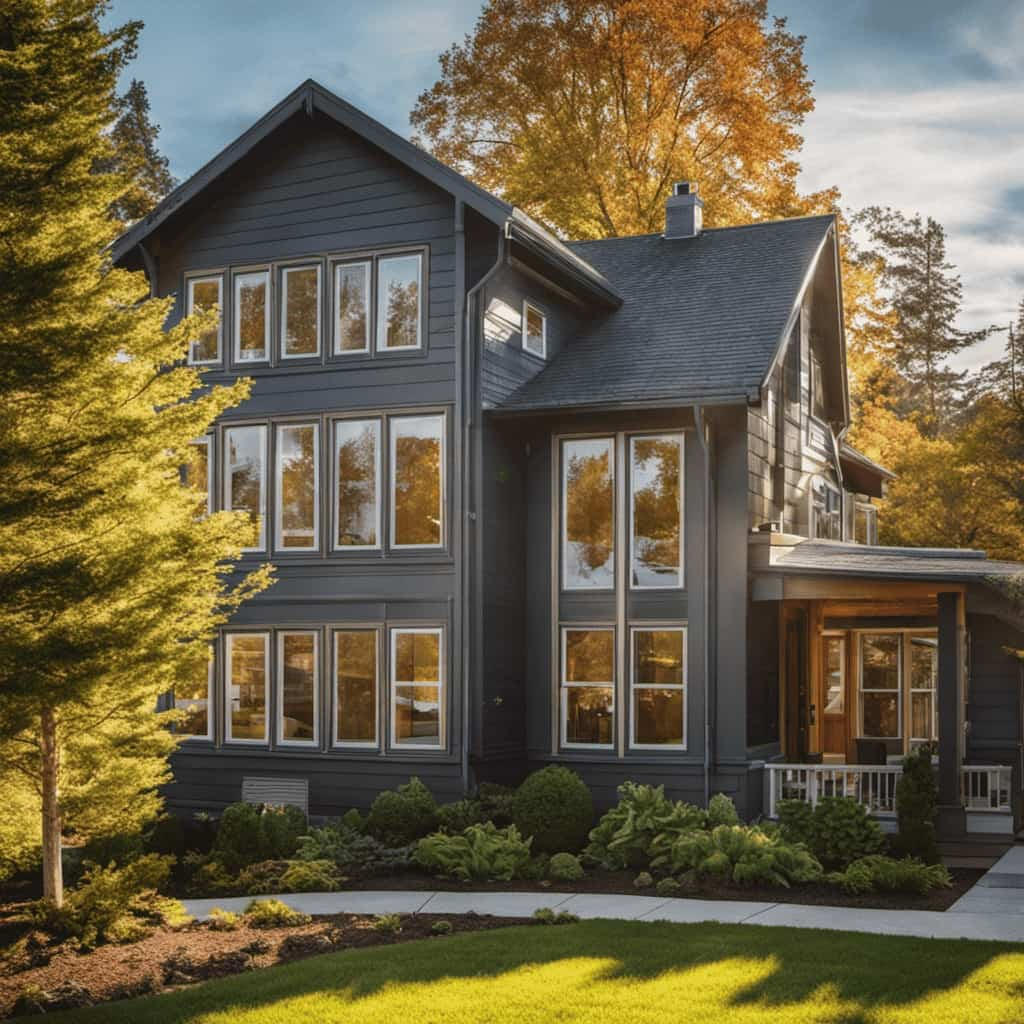
Conclusion
In conclusion, energy-efficient heat pumps are a vital component of green homes, providing sustainable heating and cooling. By understanding how they work and considering key factors when choosing a heat pump, homeowners can maximize energy savings.
Regular maintenance is also essential to ensure optimal performance and longevity. Just imagine a green home with a heat pump silently working, seamlessly providing comfort while minimizing environmental impact.
It’s a vision of a sustainable future that we can all strive for.
Air Conditioning
Heat Pumps Outperform Traditional Heating in Energy Use
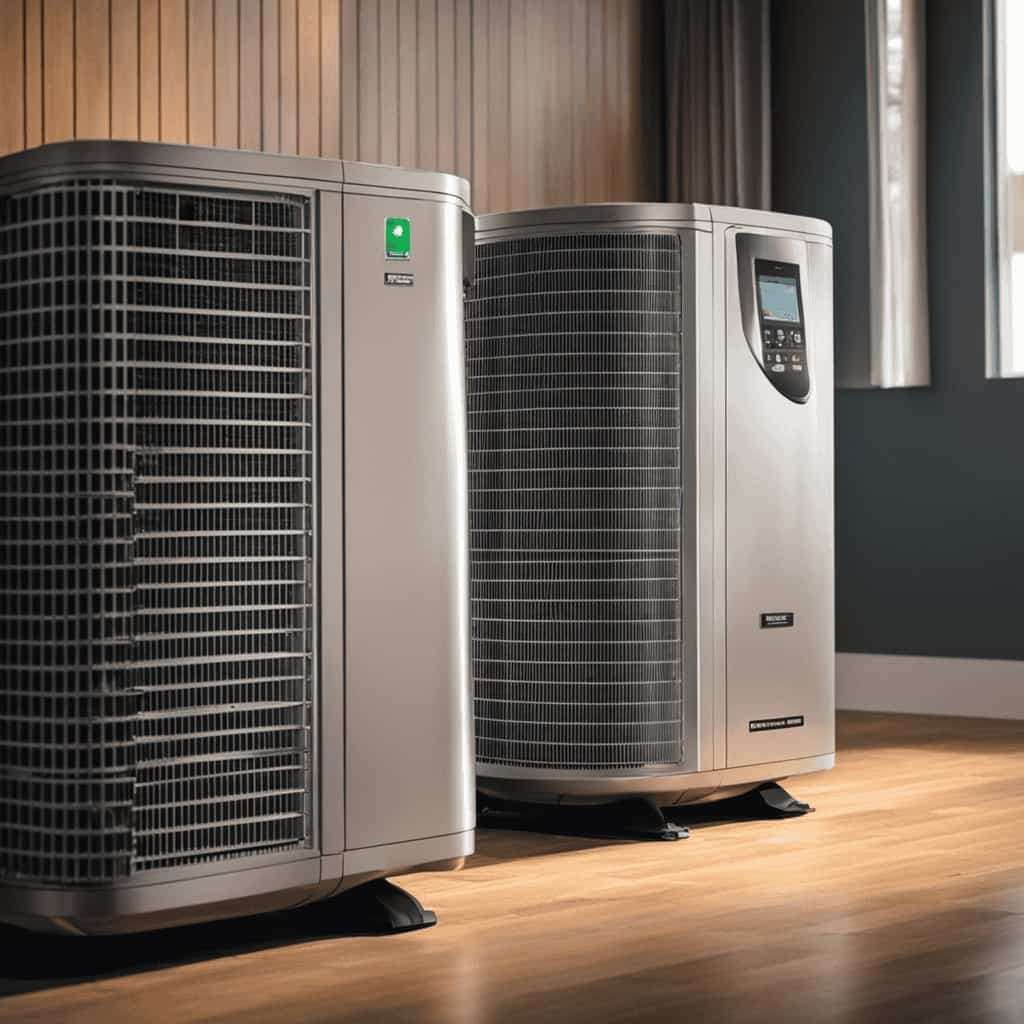
We have some thrilling news for you: heat pumps are surpassing traditional heating systems in terms of energy efficiency! Recent studies have demonstrated that heat pumps can greatly decrease electricity usage in comparison to traditional methods.
Not only that, but they also offer cost savings and have a lower environmental impact. So if you’re looking for long-term benefits and want to save money on your energy bills, heat pumps are the way to go.
Key Takeaways
- Heat pumps are more energy efficient compared to traditional heating systems.
- Heat pumps require less energy to heat a space compared to traditional heating systems, resulting in cost savings for the user.
- Heat pumps have a lower carbon footprint compared to traditional heating systems.
- Government incentives and rebates are available for installing energy-efficient heat pumps, further reducing the overall cost.
Energy Efficiency of Heat Pumps Vs. Traditional Heating Systems
We find that heat pumps are more energy efficient compared to traditional heating systems. Heat pumps use electricity to transfer heat from the outside air or ground into the building, making them highly efficient in terms of energy consumption. This means that they require less energy to heat a space compared to traditional heating systems, resulting in cost savings for the user.
Additionally, heat pumps have a lower carbon footprint compared to traditional heating systems. They don’t burn fossil fuels directly, reducing greenhouse gas emissions and contributing to a cleaner environment. This makes heat pumps a more environmentally friendly option for heating, aligning with the values of individuals seeking freedom to live in a sustainable and eco-conscious manner.

Electricity Consumption Comparison: Heat Pumps Vs. Traditional Heating
The electricity consumption of heat pumps is compared to that of traditional heating systems. To provide a clear analysis of electricity consumption, let’s compare the energy savings of heat pumps and traditional heating systems in a 3×3 table:
| System | Electricity Consumption | Energy Savings |
|---|---|---|
| Heat Pumps | Lower | Significant |
| Traditional Heating | Higher | Less significant |
As shown in the table, heat pumps have lower electricity consumption compared to traditional heating systems. This translates into significant energy savings for users. Heat pumps are designed to efficiently extract heat from the surrounding environment, making them more energy-efficient than traditional heating methods. By utilizing renewable energy sources, such as air, water, or the ground, heat pumps reduce reliance on fossil fuels and contribute to a greener and more sustainable future. With their superior energy efficiency, heat pumps are an excellent choice for those looking to minimize electricity consumption while maximizing energy savings.
Cost Savings With Heat Pumps: a Comparative Analysis
Comparing the cost savings of heat pumps to traditional heating systems provides valuable insights into the potential financial benefits of using heat pumps. When it comes to cost savings, heat pumps have a clear advantage over traditional heating systems. Here are some key points to consider:
-
Energy savings: Heat pumps are highly efficient and can save homeowners a significant amount of money on their energy bills. They can extract heat from the air or ground, making them much more energy-efficient than traditional heating systems.

-
Return on investment: While heat pumps may have a higher upfront cost, their long-term savings can make up for it. The energy savings over time can result in a positive return on investment for homeowners.
-
Lower operating costs: Heat pumps require less energy to operate compared to traditional heating systems, resulting in lower monthly utility bills.
-
Reduced maintenance costs: Heat pumps are generally low-maintenance, which means homeowners can save on costly repairs and maintenance fees.
-
Potential incentives: In many areas, there are government incentives and rebates available for installing energy-efficient heat pumps, further reducing the overall cost.
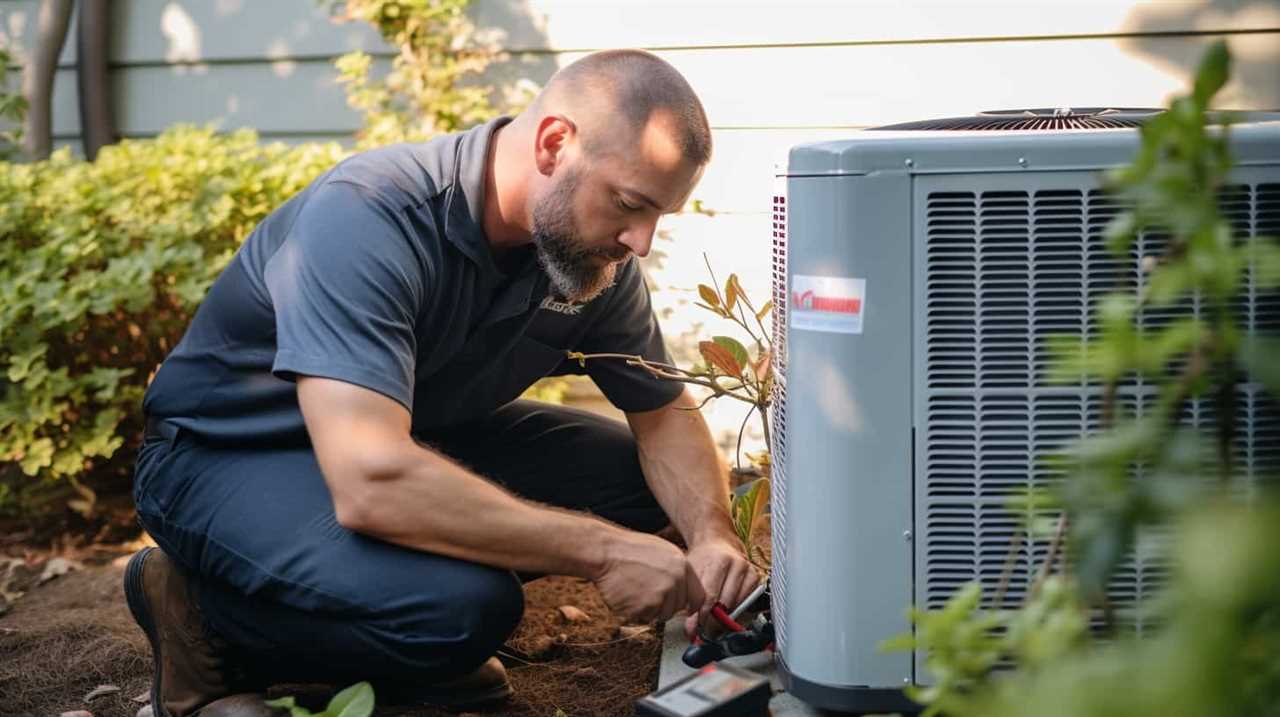
Environmental Impact: Heat Pumps Vs. Traditional Heating Methods
While traditional heating methods contribute to environmental degradation, heat pumps offer a more sustainable alternative. Heat pumps utilize renewable energy sources, such as the air or ground, to provide heating and cooling for homes and buildings. This means they produce fewer carbon emissions compared to traditional heating methods that rely on fossil fuels. By reducing carbon emissions, heat pumps play a crucial role in mitigating climate change and promoting a cleaner environment.
Additionally, heat pumps can be integrated with renewable energy systems, such as solar panels, further reducing reliance on non-renewable energy sources. This integration allows for a more efficient and environmentally-friendly heating solution.
Long-Term Benefits of Heat Pumps in Electricity Usage
As we consider the long-term benefits of heat pumps in electricity usage, it’s important to recognize that they significantly reduce energy consumption compared to traditional heating methods. This not only leads to cost savings in the long run but also contributes to energy conservation efforts.
Here are some key points to highlight:
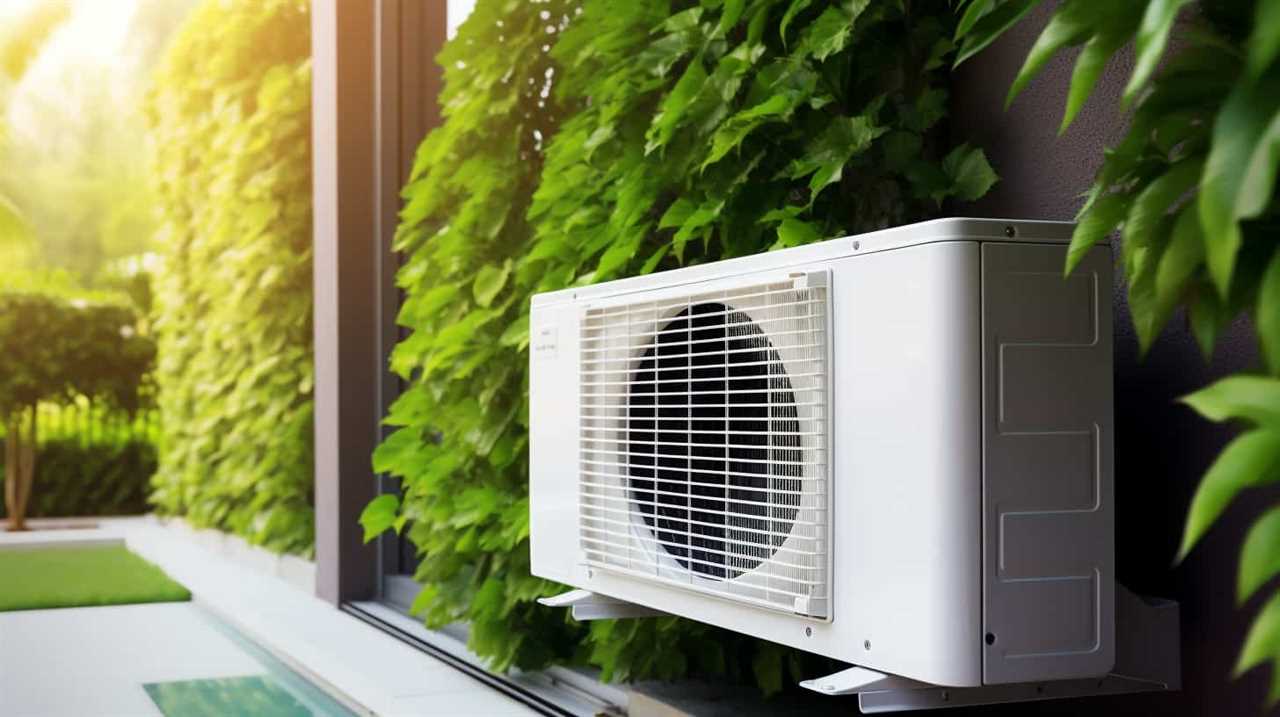
- Heat pumps are highly efficient in converting electricity into heat, resulting in lower energy consumption.
- By reducing energy usage, heat pumps help to lower electricity bills and provide long-term savings.
- Heat pumps have a longer lifespan compared to traditional heating systems, reducing the need for frequent replacements.
- The use of heat pumps can reduce greenhouse gas emissions, contributing to a cleaner environment.
- Heat pumps can be integrated with renewable energy sources, further reducing reliance on fossil fuels.
Frequently Asked Questions
What Are the Different Types of Heat Pumps Available in the Market?
There are several types of heat pumps available in the market. They include air source heat pumps, geothermal heat pumps, and hybrid heat pumps. Each type has its own advantages in terms of heat pump efficiency and benefits of heat pump technology.
How Do Heat Pumps Work in Cold Climates?
In cold climates, heat pumps work efficiently by extracting heat from the outside air or ground and transferring it indoors. This provides an energy-efficient heating solution, making heat pumps advantageous in cold weather.
Are Heat Pumps Suitable for Both Residential and Commercial Buildings?
Heat pumps are a cost-effective solution for both residential and commercial buildings. They not only provide efficient heating and cooling, but also offer environmental benefits by significantly reducing carbon emissions compared to traditional heating methods.
Can Heat Pumps Be Used for Both Heating and Cooling Purposes?
Heat pumps are a versatile solution for both heating and cooling. They offer several advantages for cooling, such as energy efficiency and lower operating costs compared to traditional cooling systems.
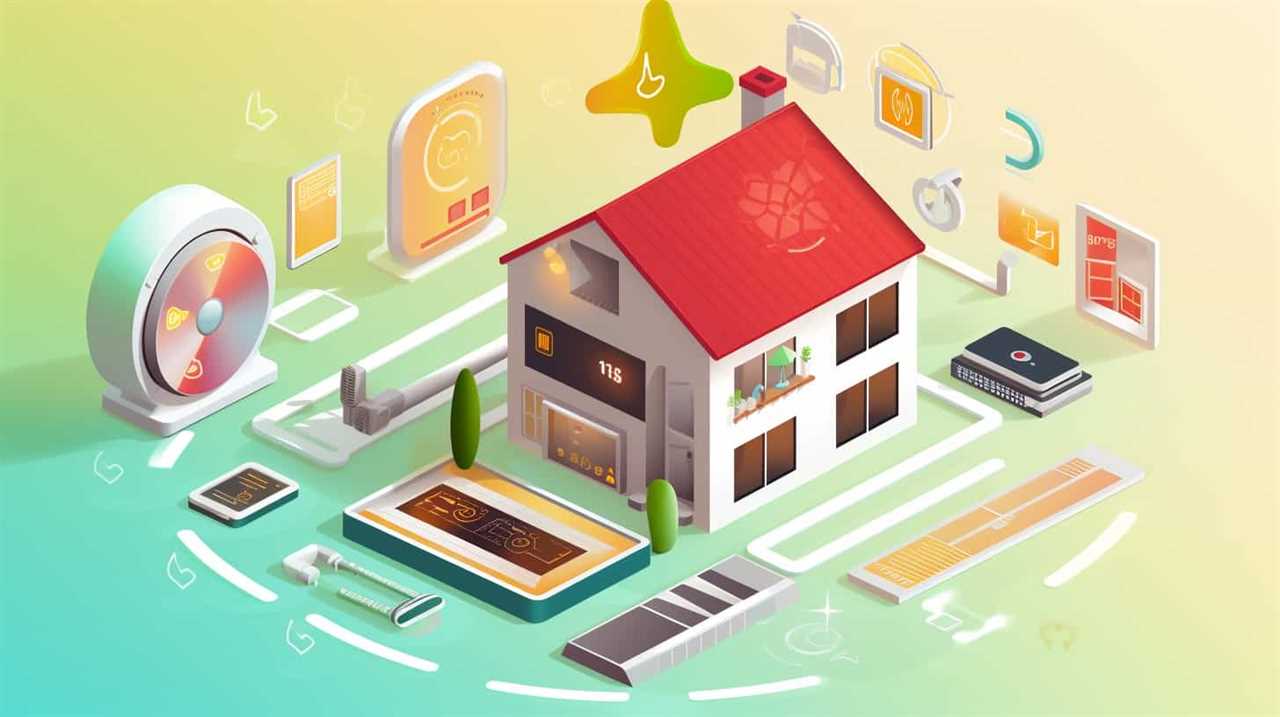
Are There Any Government Incentives or Rebates Available for Installing Heat Pumps?
There are government incentives available for installing heat pumps, which can help offset the cost. Heat pumps are known for their energy efficiency, making them an attractive option for those looking to save on heating and cooling expenses.
Conclusion
In conclusion, heat pumps have proven to be a superior option in terms of energy efficiency, electricity consumption, cost savings, and environmental impact when compared to traditional heating methods.
Their long-term benefits in electricity usage make them a smart choice for homeowners looking to reduce their energy consumption and carbon footprint.
Switching to heat pumps coincides with a greener future and a more sustainable way of heating our homes.
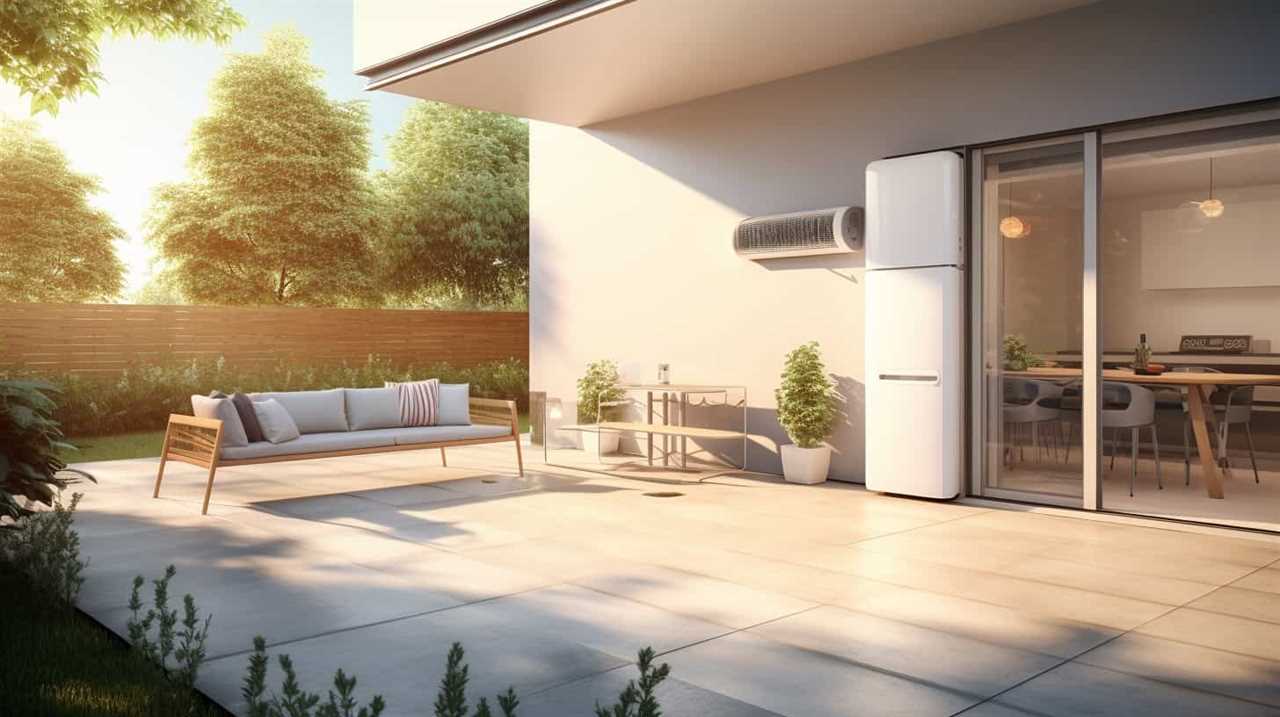
-

 Residential and Commercial Applications2 weeks ago
Residential and Commercial Applications2 weeks agoBest Amana Heat Pump Reviews
-

 Thermal Energy Transfer2 weeks ago
Thermal Energy Transfer2 weeks agoBreakthroughs in Modern Heat Pump Systems: Thermal Energy Edition
-

 Residential and Commercial Applications2 weeks ago
Residential and Commercial Applications2 weeks agoBest Heat Pump
-

 Geothermal Heat Pumps3 months ago
Geothermal Heat Pumps3 months agoUpgrade Your Comfort with Our Efficient HVAC Systems
-

 Air Conditioning3 months ago
Air Conditioning3 months agoExploring Energy-Efficient Air Conditioning Heat Pumps
-

 Geothermal Heat Pumps3 months ago
Geothermal Heat Pumps3 months agoInnovative Geothermal Heat Pump Manufacturers Revolutionize Energy Efficiency
-

 Thermal Energy Transfer1 month ago
Thermal Energy Transfer1 month agoBoost Your Heat Pump Efficiency: Interactive Guide
-

 Residential and Commercial Applications2 weeks ago
Residential and Commercial Applications2 weeks agoBest Portable Heat Pump Heat & AC










